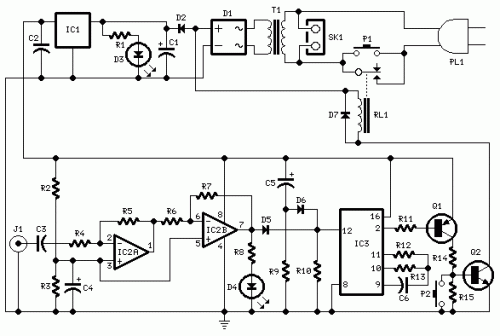- Long Delay Timer Circuit Diagram
- Jogging Timer Circuit Diagram
- Amplifier Timer Circuit Schematic
- A Very Useful Timed Beeper Circuit Schematic
- A Bedside Lamp Timer Circuit Schematic
- Safety Guard
- Midnight Security Light Circuit Schematic
- Power-Off Time Delay Relay
- Power-On Time Delay Relay
- Generating a Delayed Pulse Using The 555 Timer
- 555 timer Mono stable (one shot) circuit
- Generating Long Time Delays
- Low Voltage, High Current Time Delay Circuit
- 9 Second Digital Readout Countdown Timer
- 9 Second LED Timer and Relay Circuit
Amplifier Timer
Turns-off your amplifier when idle for 15 minutes
Fed by amplifier tape-output
Circuit diagram
Parts:
- R1,R8 1K 1/4W Resistors
- R2,R3 4K7 1/4W Resistors
- R4 22K 1/4W Resistor
- R5 4M7 1/4W Resistor
- R6,R9 10K 1/4W Resistors
- R7 1M5 1/4W Resistor
- R10 100K 1/4W Resistor
- R11 15K 1/4W Resistor
- R12 10M 1/4W Resistor
- R13 1M 1/4W Resistor
- R14 8K2 1/4W Resistor
- R15 1K8 1/4W Resistor
- C1 470µF 25V Electrolytic Capacitor
- C2,C3,C6 100nF 63V Polyester Capacitors
- C4,C5 10µF 25V Electrolytic Capacitors
- D1 Diode bridge 100V 1A
- D2,D7 1N4002 100V 1A Diodes
- D3 Red LED 5mm.
- D4 Yellow LED 5mm.
- D5,D6 1N4148 75V 150mA Diodes
- IC1 78L12 12V 100mA Voltage regulator IC
- IC2 LM358 Low Power Dual Op-amp
- IC3 4060 14 stage ripple counter and oscillator IC
- Q1 BC557 45V 100mA PNP Transistor
- Q2 BC337 45V 800mA NPN Transistor
- J1 RCA audio input socket
- P1 SPST Mains suited Pushbutton
- P2 SPST Pushbutton
- T1 220V Primary, 12V Secondary 3VA Mains transformer
- RL1 10.5V 270 Ohm Relay with SPST 5A 220V switch
- PL1 Male Mains plug
- SK1 Female Mains socket
Circuit operation:
This circuit turns-off an amplifier or any other device when a low level audio signal fed to its input is absent for 15 minutes at least. Pushing P1 the device is switched-on feeding any appliance connected to SK1. Input audio signal is boosted and squared by IC2 A & B and monitored by LED D4. When D4 illuminates, albeit for a very short peak, IC3 is reset and restarts its counting. Pin 2 of IC3 remains at the low state, the two transistors are on and the relay operates. When, after a 15 minutes delay, no signal appeared at the input, IC3 ends its counting and pin 2 goes high. Q1 & Q2 stop conducting and the relay switches-off. The device is thus completely off as also are the appliances connected to SK1. C5 & R9 reset IC3 at power-on. P2 allows switch-off at any moment.
Notes:
- Simply connect left or right channel tape output of your amplifier to J1.
- You can employ two RCA input sockets wired in parallel to allow pick-up audio signals from both stereo channels.
- The delay time can be varied changing R13 and/or C6 values.
- Needing to operate a device not supplied by power mains, use a double pole relay switch, connecting the second pole switch in series with the device's supply.
circuit from http://www.redcircuits.com/
